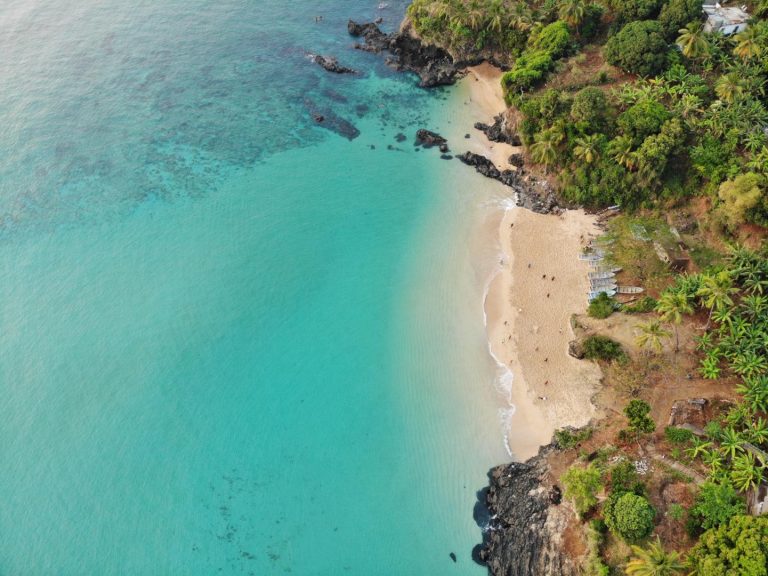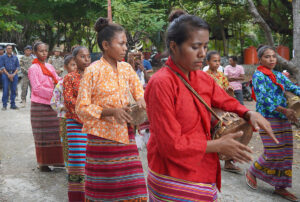Washington DC, October 21, 2008 – World Wildlife Fund (WWF) has announced that Roger Samba has been named the winner of the 2008 J. Paul Getty Award for Conservation Leadership. The annual award honors outstanding contributions to international conservation and carries with it a $200,000 prize.

M. Samba receives the Getty award, pictured with his family
Mr. Samba is a community leader in the Malagasy Republic. As the president of the remote village of Andavadoaka in southwest Madagascar, and with no conservation background, Samba organized the world’s first community run no-take zone for octopus, a local species of critical economic importance to the community, driving legislation on this and other laws to benefit the environment. This work became a model for seasonal closures and was behind the village being awarded the 2007 UN Equator Prize.
“Each year, the J. Paul Getty Award honours one of the world’s top conservationists who is helping to build the leaders of tomorrow,” said Carter Roberts, president and CEO of WWF–US, who administers the award for the Getty family. “This year the award honours Roger Samba, whose work – which originates at the community level and reaches far beyond – embodies the local to global approach so crucial in finding lasting solutions to environmental problems.”
For generations, the indigenous semi-nomadic Vezo people of Andavadoaka, Madagascar – Samba’s village – have depended on artisanal fishing activities for their livelihoods, culture and tradition. But in recent years, the region’s marine resources faced growing threats from expanding coastal populations, unsustainable tourism and an increase in international fishing fleets.
Samba spent much of the last five years working to protect the region’s fragile marine biodiversity and habitats. He created a blueprint for empowering local communities to take on management of coral reefs and related habitats. Since 2003, plans for creation of community-managed marine protected areas have spread from one village to more than 30 in the region. This work has inspired the development of ambitious alternative livelihood and environmental education initiatives, influenced national fisheries legislation, and brought unprecedented attention to marine and coastal conservation issues. Fishermen and women have travelled from across Madagascar and beyond to learn from the Andavadoaka model.
“Under Samba’s leadership,” wrote Alasdair Harris, director of scientific research at Blue Ventures, who nominated Roger, “the Andavadoaka project proved so successful that eight neighbouring villages instituted their own protected areas for octopus in order to reap similar benefits. The national government of Madagascar in 2005 also used the project as a model to create similar seasonal closures across the country. The project is a proven example of how economic development can both inspire and benefit from the conservation of natural resources.”
This year’s Getty Prize recognizes community leadership, one of three rotating themes of the award, which also honours political leadership and scientific leadership. Administered by World Wildlife Fund (WWF), the J. Paul Getty Award for Conservation Leadership is one of the world’s most prestigious awards devoted to conservation. The award, currently sponsored by J. Paul Getty’s son Gordon and his family, is intended to encourage conservation innovation and heighten public awareness of the need for conservation. Nominees for the Getty Award are submitted to WWF by conservation organizations around the world and the winner is chosen by an independent jury of individuals from a wide and distinguished array of expertise.

Dr. Garth Cripps (BV Project Coordinator), Al Harris (BV Research Director),
Roger Samba (Getty Award Winner 2008), Herilala Randriamahazo (WCS Madagascar)
Established in 1974 as The Getty Prize by the late U.S. billionaire businessman J. Paul Getty, the award was later renamed the J. Paul Getty Award for Conservation Leadership. In July 1983, former US President Ronald Reagan, in awarding that year’s winners in the Rose Garden of the White House, described the Getty Prize as “the Nobel Prize for Conservation.” Previous winners of the Getty Award have included world renowned scientists Dr. Jane Goodall, Sir Peter Scott and Pan Wenshi.
The award is unique in that it not only recognizes today’s leaders in conservation but also helps develop conservation leadership for tomorrow by establishing graduate fellowships in the name of the winner and J. Paul Getty. Samba will use his award to establish fellowships for students pursuing masters, doctoral, and post-doctoral degrees in conservation-related fields at a university of his choice in Madagascar.
Roger Samba was officially announced as this year’s winner at a presentation ceremony on October 20th in Antananarivo, Madagascar.
WWF is the world’s largest conservation organization, working in 100 countries for nearly half a century. With the support of almost 5 million members worldwide, WWF is dedicated to delivering science-based solutions to preserve the diversity and abundance of life on Earth, stop the degradation of the environment and combat climate change. Visit www.worldwildlife.org to learn more.
Blue Ventures is an award-winning marine conservation organisation dedicated to conservation, education and sustainable development in tropical coastal communities.























